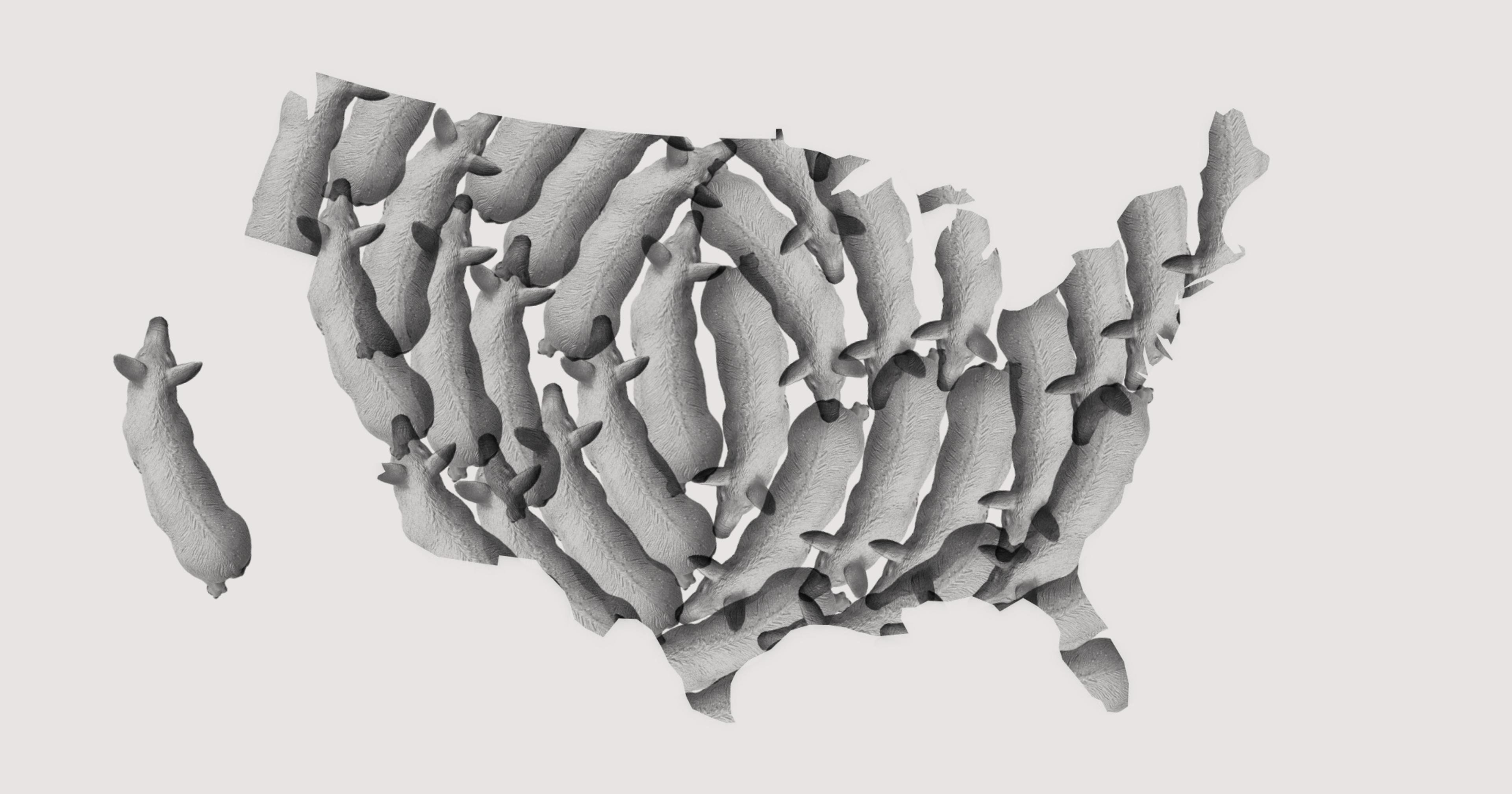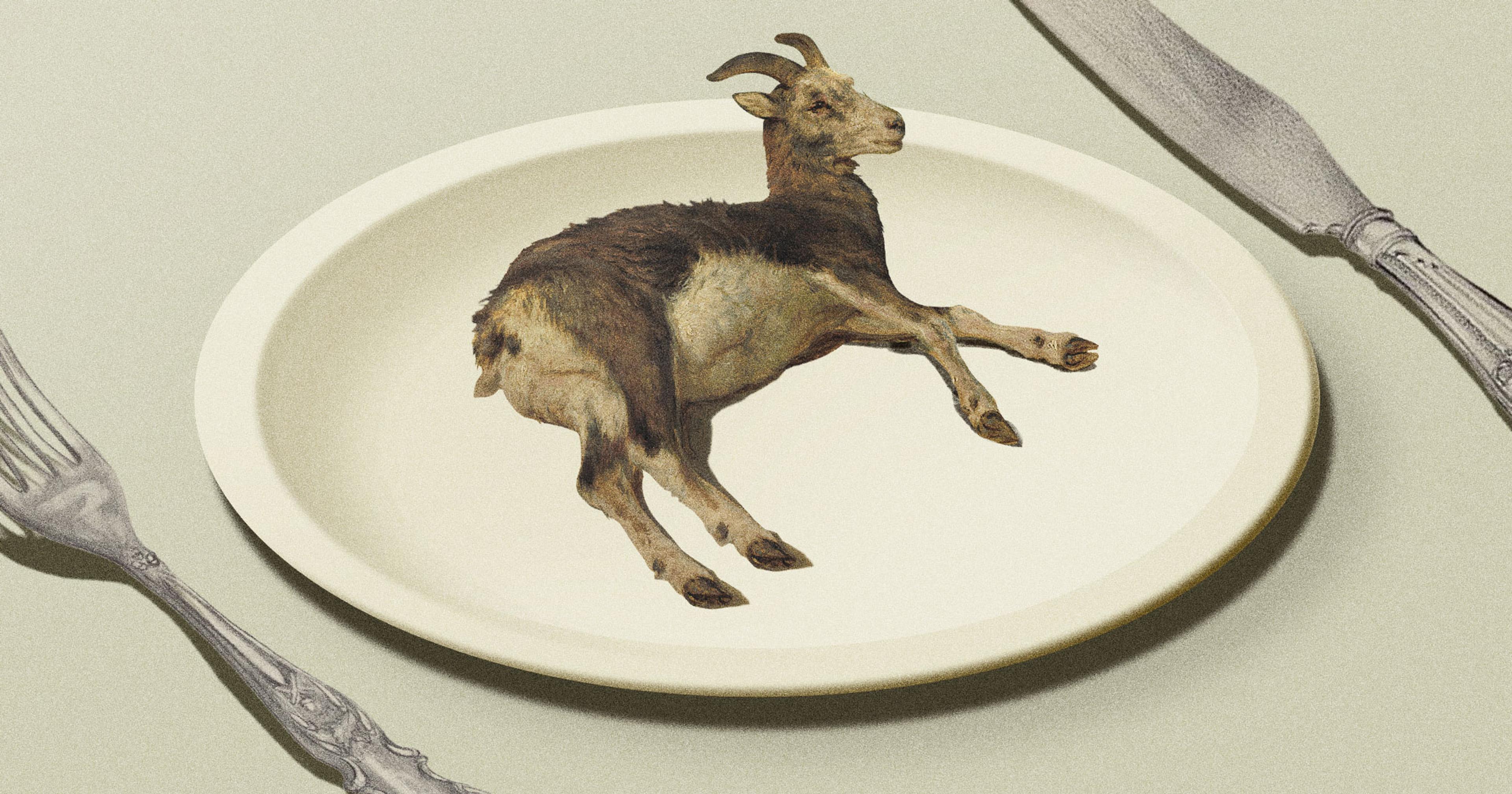California’s Proposition 12, mandating 24 feet of space for pigs, has ramifications for pig farmers — and commerce — everywhere.
Editor’s Note: The Supreme Court ultimately upheld California’s Proposition 12. Justice Gorsuch wrote for the majority: “While the Constitution addresses many weighty issues, the type of pork chops California merchants may sell is not on that list.”
The U.S. Supreme Court has heard cases of enormous consequence to wide swaths of the country this year — and as National Pork Producers Council v. Ross makes its way onto this week’s docket, it will be no exception.
“This is a case with potential ancillary impacts that could go far beyond animal welfare into everything from climate to consumer protection to every element of economic regulation,” said Chris Green, director of Harvard’s Animal Law & Policy Program.
The case centers on a contentious California law, Proposition 12, a ballot measure that passed in 2018 with the support of more than 60% of the state’s electorate. Prop 12 mandates that whole pork sold in the state must come from pigs born to sows with 24 square feet of space.
This amount of space is required to prevent treating the pigs “in a cruel manner, [...] that prevents the animal from lying down, standing up, fully extending the animal’s limbs, or turning around freely,” according to the ballot initiative.
There are no federal animal cruelty laws when it comes to livestock, and the majority of the nation’s sows are housed in much smaller enclosures — about 14 square feet, according to the National Pork Producers Council (NPPC), the group challenging the law.
“Pig farmers cannot believe these attacks,” wrote Illinois pig farmer Thomas Titus, in an op-ed published on the NPPC site. “They have dedicated their lives to providing the nation with a healthy source of protein and other nutrients at a price ordinary families can afford — and doing it ever more humanely.”

Nine other states require farmers to raise pigs by standards similar to California’s, but only for pork produced in-state. And that’s the core issue in this week’s case — not whether typical hog confinement is or is not cruel, but whether voters in one state can make commercial demands with potential industry-wide reverberations. Does California have the right to set standards for pork sold within its borders — if it comes from Iowa?
It’s a novel case, with a range of intricacies and potential implications. We spoke with Green and David Favre, the Nancy Heathcote Professor of Property and Animal Law at Michigan State University, to get a sense of what’s at stake in NPPC v. Ross.
California Calling
The NPPC is balking at the idea of forcing two standards on its producers: Pork produced for California consumers — and pork for everyone else. “Californians account for 13 percent [Ed. Note: Some sources cite this figure as 15%] of the nation’s pork consumption, but raise hardly any pigs,” the group wrote in its legal brief, arguing that California is aiming to regulate farmers in Minnesota and North Carolina, both of which produce millions more pounds of pork per year.
This argument was soundly rejected by a three-judge court of appeals, and rightly so, according to Favre. “No one has an inherent right to sell their product in any given state,” he said. “Selling pork — or anything else — in California is a voluntary act, and it’s within California’s rights to determine the conditions of the sale.”
California already has stricter standards for other products sold in-state, like its rules for milk composition, or its longstanding vehicle emissions standards. Green noted that these cases and others (see: foie gras, eggs) have all withstood multiple courtroom challenges. “Every single court that has heard these cases has said there’s just no constitutional question here,” he said, “which makes it surprising that the Supreme Court is taking this case on at all.”
Dormant Discrimination?
Plaintiffs in the case are leaning on a federal statute known as the Dormant Commerce Clause, which prevents states from enacting special restrictions or alternate pricing structures on out-of-state businesses, in an attempt to give a leg up to its own businesses. (Say, for instance, the state of Indiana mandated that all tomatoes sold from out-of-state farms had a minimum size requirement which its own farmers were exempt from.)
“States used to put extra requirements on out-of-state producers to give advantage to in-state producers,” said Favre. Proposition 12, on the other hand, imposes the same requirements on California pig farmers as anyone else — a fact emphasized in the legal response from Rob Bonta, California’s attorney general.
“National businesses and producers have had to adapt to state requirements plenty of times already.“
It’s California’s size and economic clout that give its laws an outsized national impact, according to the NPPC. Pork producers can’t afford to ignore such a large market, not to mention that only 13 to 15% of U.S.-produced pork originates in California. “The massive costs of complying with Proposition 12 fall almost exclusively on out-of-state farmers,” according to the plaintiff’s brief.
That doesn’t make the proposition discriminatory, though, according to Green and Favre. Green noted that out-of-state farmers and businesses have managed to comply with California’s other commerce requirements, or Michigan’s particular food labeling requirements, which are stricter than national standards. “National businesses and producers have had to adapt to state requirements plenty of times already,” Green said. “I think most legal scholars would agree that the constitutional question is clear.”
Yet the case’s outcome is far from assured, unsettling states like Massachusetts which voted to implement very similar standards to California for both in- and out-of-state producers. That law has twice been put on hold as they wait to see how the Supreme Court rules here.
Uncertain Terrain
Neither Green nor Favre know why this case was taken up by the Supreme Court at all, or what legal issue actually merits review. But that open question is precisely why they can’t confidently predict the outcome. “If I knew why they took it, then I might be able to say something about the various motivations for what they want to do with the case,” said Favre. “I think all of us are at sea on this one.”
Though NPPC v. Ross seems to be a classic “animal welfare versus money” debate, as Favre puts it, the underlying legal question is about upholding state’s rights. Justices Gorsuch and Thomas have consistently punted such decisions back to the state level including a woman’s right to choose. “It’s hard to imagine they reverse their own personal position and throw all that out the window for one case,” said Green.
That said, Justice Alito has aligned himself with the Dormant Commerce Clause in past cases, while the liberal-leaning Justice Kagan has ruled in favor of national pork industry interests in the past.
With so much in the air, even basic next steps seem to be in question. What if the court makes no ruling? Then the California law simply stands, and producers in other states — even other nations — will have to decide whether it’s worth modifying their practices to do business in California. Is it possible these producers will raise pigs in a two-tiered “for California” and “not for California” approach? Maybe, though Favre thinks it is more likely that California’s stricter approach would be adopted by other states — and already has been, in Massachusetts — and could eventually even lead to a national animal welfare standard.
But if the NPPC wins? Green’s program released a 60-page report speculating on this hypothetical, among others. In short, a ruling in favor of the plaintiffs could severely hinder the ability for states to adopt their own rules pertaining to commerce. “They’d basically be jeopardizing the core ability of states to ensure their own health, safety, and welfare standards,“ said Green. He then cited other commercial areas that could be affected, like energy production, alcohol, firearms, and automobiles.
“Anyone who says they know what the court is going to do is fooling themselves,” said Green. “No one knows.”







